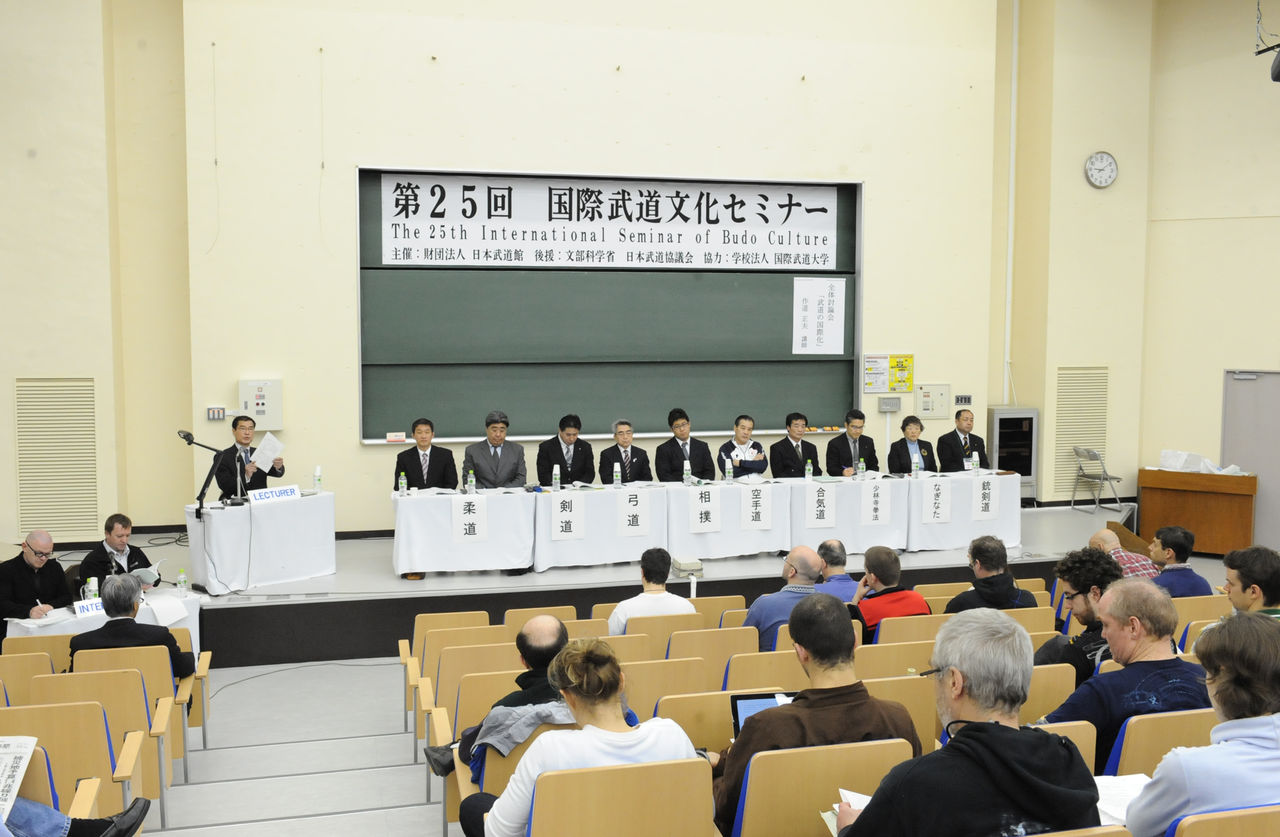I got a copy of the official report from the 25th International Seminar of Budo Culture, which was held in March. Over the next few posts I'll cover what different Japanese Budo leaders of the different Budo groups mentioned in regards to each group's internationalization efforts, and then add my reflection of those comments.
This is not an exact or perfect summary, but it should be enlightening in regards to what Budo leaders in Japan are thinking. Any mistakes are my own.
Karate
Speakers
Japan Karatedo Federation (JKF) Vice President, Mr. Kurihara Shigeo
Former JKF National Team Coach, Mr. Toshiaki Maeda
- The World Karate Federation (WKF) bid for Olympic inclusion was the biggest international goal of the JKF (seminar was held prior to the summer rejection of karate by the IOC).
- WKF President Antonio Espinos visited Japan in January to promote the Olympic bid and also to say it's important to emphasize other aspects of karate like etiquette and discipline.
- The JKF wants to see better results of Japanese athletes at the WKF world championships.
- Inside Japan, 'education & cultivation of physical & mental strength of our youth is a major pillar for the development of Karate-do' and 'after WWII there is evidence in the current state of society that education of the heart/soul and social morals are lacking'. Therefore '...the introduction of compulsory Budo education at junior high school will play a significant role in filling the gaps in present-day family, society and school education'. (pg 44-45)
- participant question - problem with victory poses in competition - former national team coach Maeda Toshiaki answered that while most would rather not see it, different cultures have different norms, especially when the stakes are high in international competition.
(source pages 43,46, 84)
Reflection on the comments
While the WKF is leading the worldwide development of karate, as it should being the sport authority, there are some problems. The emphasis on Olympic inclusion (for kumite point-fighting only) is only for elite-competitors as it doesn't enhance the wider karate recreational community nor support traditional kata learning and performance. Sure, one could argue if Olympic acceptance had happened more state support to Karate would have occured, but one, there is no clear description of how and two, it didn't happen so other plans need to be promoted.
Also, the JKF worries about etiquette, discipline, lack of morals, etc are never clearly defined. What morals? What lack of discipline? What empirical evidence shows karate practice makes people better citizens? How have junior high school students in Japan improved behavior overall due to Budo training as demonstrated by what studies?
It could be argued the pre-WW2 morals of Japanese right-wing political society which directly infested Budo arts were far worse before 1945 than after. It was the Occupation authorities which forced Budo to restructure into less harmful organizations.
Don't get me wrong, I'm glad to see at least in Japan there are Budo lessons in all junior high schools. Karate is taught in my school and some of these students then come join the karate club I coach here. But when it comes to reasons, just because someone wants something to be true doesn't make it true. We need to be more factual with an impact assessment performed regularly especially if being taught in the schools, otherwise it similar appears as a nationalism exercise.
It would be nice to see the JKF take a more public stance on the how the new WKF kata rules are weakening traditional karate by allowing for any interpretation of a kata. Coming up with some effective advise for how to improve overseas kata performance in cooperation with the large style groups is needed to make an effort to revise this new WKF kata policy.
About the victory poses - like the fist pump or 'gut's pose' - I'm not so worried about it as I pay attention more to a competitor's overall attitude towards their opponents and to the officials. A bow is like a handshake so do they at least show this courtesy entering or leaving the mat, that they respect the efforts of everyone involved? I've seen athletes win with no expression, then refuse to bow or shake hands with their opponent afterward, which I think is rude.
Emotion should be allowed, but within reason. Running around the ring with one's flag would be silly after winning a big match, just as not accepting a sportsman-like gesture to shake hands with an opponent who offers it.
For Karate promotion internationally, I would rather see the WKF and other groups try to enhance what has been established now by building more opportunities for the current karate world to interact more with greater equality. Style groups should be supported so that they then can bring their support to the WKF. Except for kumite, the WKF should not go style-less for kata competition, but reinforce better standards, which is much more easy to do with all the technology at our fingertips. And the promotion of Karate should be about the personal health benefits and the inclusion into a vibrant community, without relying on negative unquantifiable reasons for why anyone should do karate.
Other posts will cover comments for judo, kendo, sumo, kyudo, Shorinji kempo, naginata and jukendo.
To register for next year's seminar, keep an eye on this Nippon Budokan webpage.
http://www.nipponbudokan.or.jp/shinkoujigyou/gyouji_07.html

